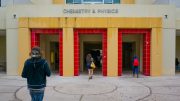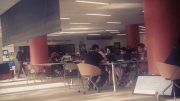With the launch of the STEM Transformation Institute this week, science, technology, engineering and mathematics students will now tackle their fields hands-on.
The University launched the STEM Transformation Institute on Tuesday, an initiative aiming to create a premier interdisciplinary science, technology, engineering and mathematics think tank at the University and also to become a national laboratory for the STEM fields of education.
The institute will help the 7,500 undergraduate students enrolled in STEM majors get a hands-on experience in the classroom with the goals of improving the classroom environment, conducting research on changes in methods of teaching and developing different types of curriculum materials.
Associate Physics Professor Laird Kramer, founding director of the Institute, explained that the initiative began 10 years ago while the Department of Physics was conducting research projects funded by a large grant.
“We [found] that lecturing is not an effective way of learning,” Kramer said. “The idea is we want to make classes more actively engaging. We took knowledge from what was out there and applied it to [the University].”
The institute was a response to a national imperative for more scientists and engineers. The national need in the science and engineering fields produced an additional million STEM graduates to fill the mounting need of corporations and industries for technologically-experienced professionals.
“The idea is to get more faculty to do these practices, do more research and become a national model,” Kramer said.
The institute will have a “physical and virtual aspect” that includes “the new Stempel building that will have an active classroom… [and] Viertes Haus is the start of it,” Kramer said.
Along with Kramer, several faculty are aiding the initiative, including Masoud Milani, associate professor of the Department of Engineering, Maria Fernandez from the College of Education and an executive committee consisting of deans from the colleges of arts and sciences, education and engineering. The executive committee also includes Andres Gil, vice president of research, University Provost Douglas Wartzok and Vice Provost Elizabeth Bejar.
“One of our biggest supporters has been President [Mark Rosenberg],” Kramer said. “This has been a presidential initiative.”
The departments involved in the initiative include physics, chemistry, earth science, biology, mathematics and parts of the colleges of education, engineering and computer science.
The institute is funded internally by the Office of the Provost and a number of departments. Kramer also shared that the goal is to eventually have the institute sustain itself through grants and foundations.
“Our lab is the classroom space,” Kramer said. “These are experiments in what’s working and what’s not working.”
The institute has also been working with Miami-Dade County schools on several student engagement projects.
Among these is the “Teach STEM Miami,” a program that provides high-quality science and mathematics teacher preparation for future elementary and secondary school teachers.
“The whole campus is a lab for us,” Kramer said. “There’s really no bounds. We want to look at what impacts students to become professionals.”







Be the first to comment on "University to become STEM lab with new institute"